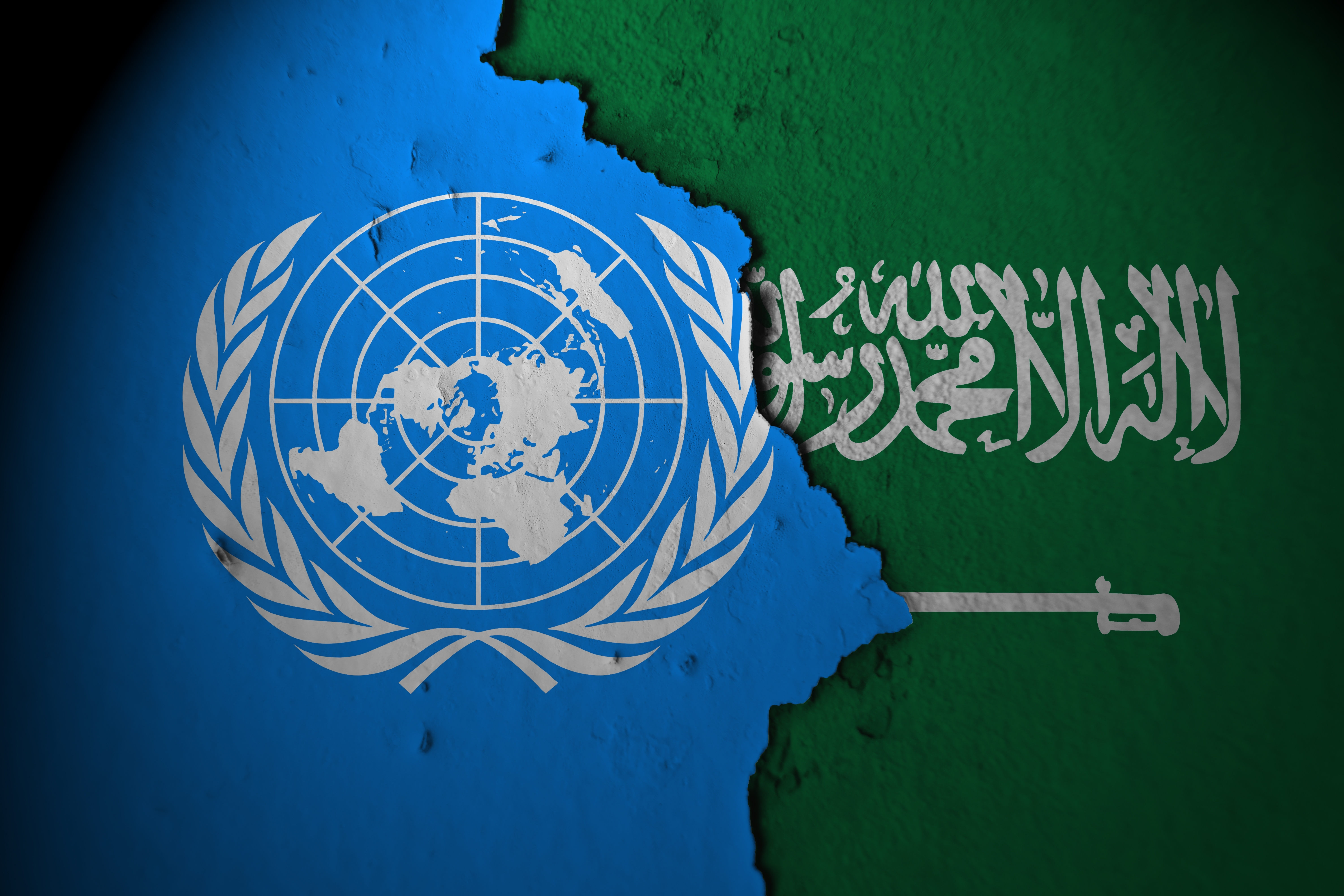October 29, 2025

©Shutterstock: ID 2535940885.
October 22, 2025
To: Mr. Alexandre Zouev
Acting Under-Secretary-General for Counter-Terrorism
Head of UN Office of Counter-Terrorism (UNOCT)
Executive Director of the United Nations Counter-Terrorism Centre (UNCCT)
Re: Urgent concerns regarding relationship of UNOCT and UNCCT with Saudi authorities and its Presidency of State Security
Dear Mr. Zouev,
We, leading Saudi Arabia-focused human rights organization ALQST for Human Rights and Geneva-based legal advocacy organization MENA Rights Group, write to express our grave concerns regarding the UN Office of Counter-Terrorism (UNOCT) and UN Counter-Terrorism Centre (UNCCT)’s problematic relationship with Saudi authorities and its Presidency of State Security (PSS), in relation to their systematic abuse of counter-terrorism frameworks to commit widespread human rights violations.
Background and previous correspondence
On July 14, 2025, we addressed these concerns with your predecessor, Mr. Vladimir Voronkov, and to Mr. Mauro Miedico, regarding UNCCT’s ties with Saudi Arabia’s PSS.1
We found the response received inadequate, offering only generic assurances about adherence to the Global Counter-Terrorism Strategy (GCTS) while failing to address any of our specific concerns or provide the clarifications we requested.
Your appointment as Acting Under-Secretary-General, as well as the upcoming review of the GCTS, present a critical opportunity to reassess these relationships and align UNOCT’s operations with the UN’s fundamental human rights commitments.
Systematic abuse under the pretext of countering terrorism
Saudi Arabia’s 2017 Law on Combating Crimes of Terrorism and its Financing has been criticized by UN Special Procedures for containing overly broad definitions and providing “almost unconstrained powers to the PSS in the field of counterterrorism” with “far-reaching scope of authority and discretion.”
Recent cases that illustrate the systematic nature of these abuses include women’s rights activist Manahel al-Otaibi who was convicted of “terrorist offences” for tweets supporting women’s rights and journalist Turki al-Jasser, who was executed in June 2025 on false terrorism charges after spending seven years in PSS-run detention facilities.
These cases, among many others, demonstrate how Saudi authorities weaponize counter- terrorism legislation to suppress peaceful dissent and target human rights defenders and journalists.
Saudi Arabia’s disproportionate and problematic influence
As documented in MENA Rights Group’s recent analysis on the influence of Middle East and North Africa states in the UN Counter-Terrorism architecture, Saudi authorities have secured an unprecedented level of influence within the UN counter-terrorism system that fundamentally compromises its independence and integrity.
As you know, Saudi Arabia is the largest donor to UNCCT with $110 million, representing 69% of the Centre’s total contributions. The Kingdom has held the Chair of UNCCT’s Advisory Board since the Centre’s establishment in 2011, and Ambassador Abdulaziz Al-Wasil serves as one of only three individuals listed as UNOCT’s management alongside yourself and Director Mauro Miedico. According to UN audits, this funding was expected to be depleted by the second quarter of 2023, creating ongoing dependence on Saudi contributions for UNOCT’s viability.
Direct collaboration with human rights abusers
Most alarmingly, in April 2025, UNCCT co-organized a roundtable on “the Impact of New Technologies on Countering the Financing of Terrorism” with Saudi Arabia’s PSS, the Kingdom’s main security body and notorious arm of repression. The high-level opening session featured a speech by PSS head Abdul Aziz bin Mohammed al-Howairini, who was directly involved in the gruesome murder of Saudi journalist Jamal Khashoggi at the Saudi consulate in Istanbul in 2018, as confirmed by former UN Special Rapporteur Agnes Callamard’s investigation. The PSS also operates approximately 20 prisons and secret detention facilities and has been at the forefront of an unprecedented crackdown against peaceful dissidents since 2017.
This collaboration is all the more concerning given the complete lack of civil society consultation or input, reflecting a broader systematic pattern of civil society exclusion by the UN counter-terrorism architecture, as documented by former Special Rapporteur Fionnuala Ní Aoláin’s Global Study and civil society. It also contradicts the UN Global Counter-Terrorism Strategy’s clear articulation that counter-terrorism efforts neglecting the rule of law and committing widespread human rights abuses are ineffective.
Questions for new leadership
Given your recent appointment and the inadequate response to our previous correspondence, we urgently request your clarification on the following:
- Relationship with PSS: What has been the rationale between UNOCT/UNCCT’s cooperation with Saudi authorities, and how have counter-terrorism related human rights considerations been integrated in this relationship? Looking ahead, what is the nature of UNOCT/UNCCT’s planned relationship with the PSS and Mr. al-Howairini specifically? Will you end all collaboration with this entity given its documented human rights abuses?
- Independence measures: What concrete measures will you implement to ensure UNOCT/UNCCT’s independence from Saudi authorities, considering the Centre’s heavy reliance on Saudi funding and the Kingdom’s disproportionate influence in management structures?
- Human rights compliance: What specific steps will you take to address civil society and UN human rights bodies’ documented concerns about gross human rights abuses committed by Saudi authorities under the pretext of countering terrorism?
- Policy review: Will you conduct a comprehensive review of all partnerships and collaborations with states that systematically abuse counter-terrorism frameworks to violate human rights, starting with Saudi Arabia?
- Strategic framework: As the development of UNOCT's new Strategic Framework is underway and the review of the Global Counter-Terrorism Strategy approaches, how will you ensure that civil society inclusion, human rights and fundamental freedoms are meaningfully prioritized as cross-cutting issues rather than sidelined or treated as secondary considerations?
We urge you to use your appointment as an opportunity to fundamentally reassess UNOCT’s relationships and ensure that the Office operates in full compliance with international human rights standards. This requires ending collaborations with entities like the PSS that systematically abuse counter-terrorism measures to violate human rights, regardless of their financial contributions. At the very least, such collaborations should be critically re-assessed and reshaped with the meaningful consultation of human rights-focused civil society actors with expertise on Saudi authorities’ highly concerning counter-terrorism related human rights record.
The credibility and integrity of the UN counter-terrorism architecture depend on your willingness to prioritize human rights over financial considerations and to hold accountable those who abuse counter-terrorism frameworks to commit widespread human rights violations.
We look forward to your substantive response to these concerns and request a meeting to discuss these critical issues directly.
Sincerely,
ALQST for Human Rights and MENA Rights Group
--
1 For ease of reference, the response we received was the following:
"(...) We appreciate hearing your views on UNOCT/UNCCT’s collaboration with the Kingdom of Saudi Arabia.
UNOCT, as an Office of the UN Secretariat, is mandated to support the balanced implementation of the Global Counter- Terrorism Strategy (GCTS), and to lead in efforts across the UN Counter-Terrorism architecture to ensure coherence and coordination in supporting Member States to counter terrorism and prevent and counter violent extremism conducive to terrorism.
Part of these efforts is to work towards strengthening collaboration and coordination with all Member States and other stakeholders through different levels of engagement. As a result, UNOCT and UNCCT work with all Member States to further these objectives, particularly through the provision of capacity building initiatives. Within these efforts, UNOCT and UNCCT strive to ensure that our responses are anchored in the rule of law, human rights and gender equality.
We will continue to have these important discussions with Member States and partners, emphasizing the importance of Pillar IV of the Global Counter-Terrorism Strategy, whilst also highlighting the centrality of human rights and gender as cross cutting issues. (...)"






